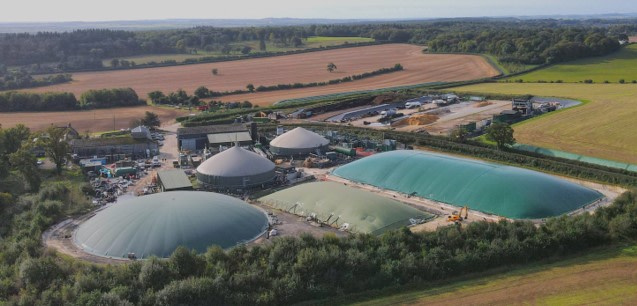Digestate is a co-product of the anaerobic digestion process and is highly regarded as a soil improver for several reasons, leveraging both its nutrient content and physical properties to enhance soil health and fertility:
- Rich in nutrients: Digestate is packed with essential nutrients needed by plants, including nitrogen (N), phosphorus (P), and potassium (K), among others. These nutrients are in readily available forms for plant uptake, making digestate an excellent natural fertiliser that can reduce the need for synthetic fertilisers.
- Improves soil structure: The addition of digestate can enhance soil structure, increasing its porosity and aggregate stability. This improvement in soil structure can enhance water retention and drainage, making soils more resilient against both drought and excessive rainfall.
- Increases organic matter content: Incorporating digestate into soil boosts its organic matter content, which is crucial for maintaining soil health. Higher organic matter levels can improve soil fertility, water holding capacity, and microbial activity, contributing to a more vibrant and sustainable ecosystem within the soil.
- Promotes microbial activity: The organic compounds in digestate serve as food for soil microorganisms, which play a vital role in soil health. These microorganisms help break down organic matter into nutrients that plants can absorb, promote soil structure, and compete with harmful pathogens, reducing disease risks.
- Sustainable and eco-friendly: Using digestate as a soil improver recycles waste products from the anaerobic digestion process, reducing landfill use and greenhouse gas emissions. This practice supports sustainable agriculture by closing the loop on waste and nutrient cycles.
- Reduces chemical use: By providing a natural source of nutrients and improving soil health, digestate use can reduce the need for chemical fertilisers and pesticides. This can lead to healthier soils and reduced environmental impact from agriculture.
- Versatility: Digestate can be applied in both liquid and solid forms, making it adaptable to various agricultural practices and soil types. This versatility ensures that it can be used effectively in different farming systems and environments.
By improving soil health, structure, and fertility, digestate contributes to more sustainable agricultural practices, enhances crop yields, and helps mitigate climate change impacts, making it a valuable resource for modern farming
Apsley Farms’ solid digestate, sold as soil improving mulch, is 100% peat-free and approved for organic use. Highly effective in improving soil health by adding essential NPK micronutrients and organic matter. A layer of our mulch retains moisture in the soil during dry spells, protects in extreme weather, suppresses weeds and repels slug and snails too.
To use our mulch as a compost, mulch need to be mixed with soil. Ideally 30% mulch and 70% soil. Or you can leave the mulch as a layer on the surface for a month before planting into it. Find out more here
Digestate is a co-product of the anaerobic digestion process

About Apsley Farms

Sustainability and efficiency are at the heart of everything we do at Apsley Farms. We’ve adopted cutting edge technologies and turned low value crops into renewable energy. We focus on a circular economy by returning the nutrients in our digestate products back to the land as a fertiliser.
Our process of generating green gas and other important by-products ticks three important boxes: it displaces natural gas (fossil fuel) in the gas grid to heat people’s homes; it displaces CO2 made by the fertiliser industry, which is essential in the food industry; and it simultaneously generates natural fertiliser in the process!
